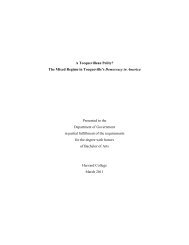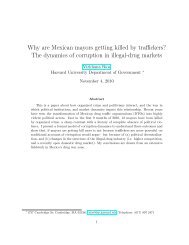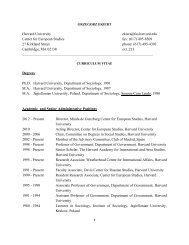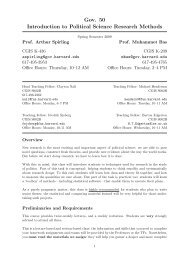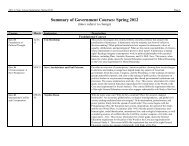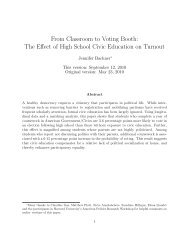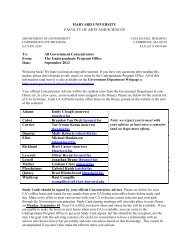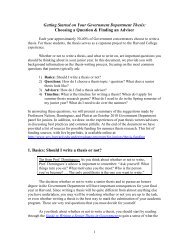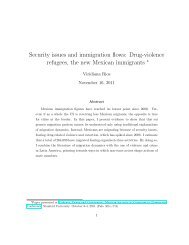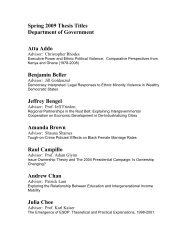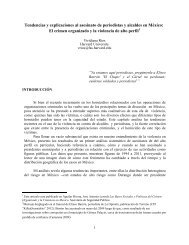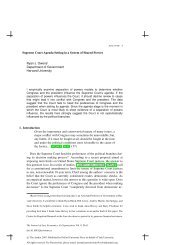1 Harvard University Political Theory Colloquium For 11 March 2010 ...
1 Harvard University Political Theory Colloquium For 11 March 2010 ...
1 Harvard University Political Theory Colloquium For 11 March 2010 ...
You also want an ePaper? Increase the reach of your titles
YUMPU automatically turns print PDFs into web optimized ePapers that Google loves.
27 <br />
agreement at 480e: ‘I think these statements are absurd, Socrates, though no doubt you<br />
think they agree with those expressed [and agreed to by Polus] earlier’, trans. Zeyl; for<br />
Callicles, the response to Socrates’ question ‘Are we to put this down as true?’ as<br />
‘Certainly, if that pleases you more’ (514a, trans. Zeyl). These failures to integrate words<br />
and deeds (even at the level of enacting allegiance to their own verbal agreements) model<br />
a paradigm failure of the virtue of temperance, arising (we may infer on the basis of the<br />
argument of this paper) from a failure of the executive rule of knowledge. In this respect<br />
it is the drama of the dialogues more than the purported teaching of the measure doctrine<br />
which can instruct us. 26<br />
Bibliography<br />
Ainslie, George (2001). Breakdown of Will. Cambridge: Cambridge <strong>University</strong> Press.<br />
Annas, Julia (1985). ‘Self-knowledge in Early Plato.’ In Dominic J. O’Meara (ed.)<br />
Platonic Investigations, <strong>11</strong>1-38. Washington, D.C.: The Catholic <strong>University</strong> of America<br />
Press. (Studies in the Philosophy and the History of Philosophy, vol.13.)<br />
Bobonich, Christopher (1994). ‘Akrasia and Agency in Plato’s Laws and Republic’.<br />
Archiv für Geschichte der Philosophie 76:1, 3-36.<br />
----- (2002). Plato’s Utopia Recast: His Later Ethics and Politics. Oxford: Clarendon<br />
Press.<br />
Burnyeat, M.F., and Jonathan Barnes (1980). ‘Socrates and the Jury: Paradoxes in Plato’s<br />
Distinction between Knowledge and True Belief’. Proceedings of the Aristotelian<br />
Society, Supplementary Volume, vol.54, 173-91 and 193-206.<br />
Davidson, Donald (2001 [1980]). ‘How is Weakness of the Will Possible?’ In Davidson,<br />
Essays on Actions and Events, 21-42. New York: Oxford <strong>University</strong> Press.<br />
Dent, N.J.H. (1984). The Moral Psychology of the Virtues. Cambridge: Cambridge<br />
<strong>University</strong> Press.<br />
Denyer, Nicholas (ed.) (2008). Plato. Protagoras, Cambridge Greek and Latin Classics<br />
edn with commentary. Cambridge: Cambridge <strong>University</strong> Press.<br />
Ferrari, G.R.F. (1992). ‘Akrasia as neurosis in Plato’s Protagoras’. In John J. Cleary and<br />
Daniel C. Shartin (eds) Proceedings of the Boston Area <strong>Colloquium</strong> in Philosophy 1990<br />
(vol.VI), <strong>11</strong>5-40. Lanham, MD: <strong>University</strong> Press of America.



